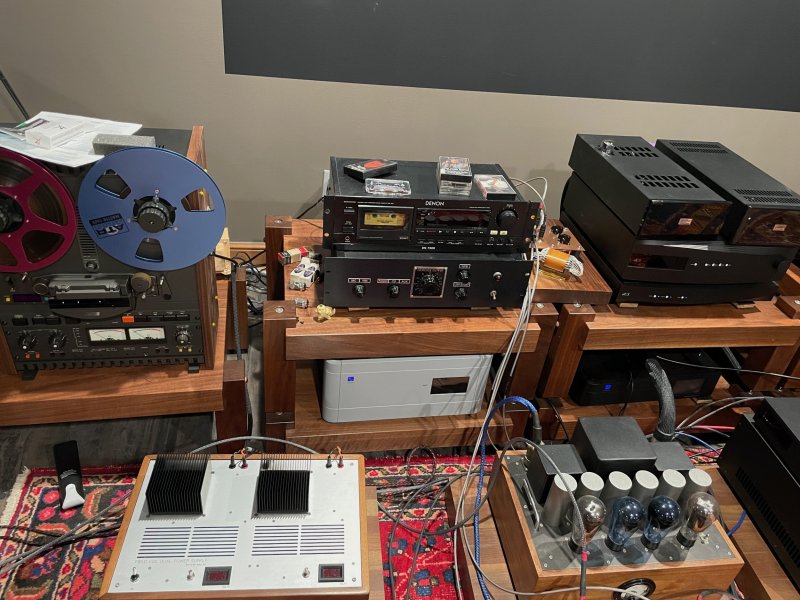I started with an MX-5050, and later changed to a Nagra T-Audio, refurbished by Nagra Switzerland. Those were the days when hardly anyone wanted R2R, and I was making concert recordings with a Nagra IV-S. I also built a balanced-differential tube preamp for the playback head, before any of the commercial tape head preamps were available except the Manley. Studio machines tend to have excellent mechanics but mediocre sounding (but accurate) playback electronics, since they were not meant for audiophiles. The MX-5050 was competent, but the professional machines are at a totally different level. Kind of like me playing tennis with Nadal.
I never invested much in digital, since the technology changes too quickly. I also have a system that can take full advantage of the dynamics of R2R tapes, being a multi-way horn system with field coil drivers and electronic crossover. The problem with digital music is not the digital per se, but how the material was mastered. Most commercially available digital music is compressed and manipulated to death. The problem with R2R is, of course, the lack of software. This is not as much of a problem for me, as I have dozens of session masters that I have made over the years, mainly of orchestral concerts but also some chamber music. I also have access to straight copies of production or safety masters of commercial recordings from companies such as Decca, EMI/HMV, RCA and Mercury. Most of these masters were copied from the edited work parts with some equalization to correct faults, but in those days, they did not apply compression or dynamic limiting (though sometimes they did gain riding). That means these tapes tend to have very wide dynamic range, and sound very transparent due to the lack of manipulation. Some tapes from the mid-70s onwards had Dolby A, and I find the earlier tapes from pre-Dolby days usually more transparent.
The problem with digital, in my opinion, is that those recordings made during the 80s and early 90s using redbook CD standard are quite limited in their potential, and even a great mastering engineer is quite limited in what he can do. That means, you are restricted to materials that were recorded in the past 15 years, or analogue recordings that were digitalised during the same period. And to be frank, very few new recordings made in the past 2 decades can compare with recordings made during the 1960s and 70s, at least for classical, with great engineers such as Kenneth Wilkinson, Gordon Perry, Robert C. Fine, Lewis Layton, Christopher Parker etc. That means for digiphiles who like classical, they have to rely on reissues that can be quite spotty in quality. Therefore, I think R2R is indispensable for people who listen mainly to classical recordings made from the mid-50s to the late 70s, if they have access to these tapes. For reference, listen to some of the RCA tape issues from Analogue Productions, the Decca issues from the Tape Project etc. There will be a new source for EMI/HMV recordings coming straight from Abbey Road Studios soon, as well as from the archives of Propius in Sweden. For digital, you can get close to the same experience with rare transfers such as the DSD file of the Mercury Dorati Firebird, for example. I am sometimes still gobsmacked when I put on some of these master tapes, such as a few days ago when I put on the Decca Ansermet Three Cornered Hat. I have yet to find a good digital transfer for this one. Another one that is utterly crazy is a copy of the production master of the 1955 Munch Symphonie Fantastique, used to produce the original 2-track commercial pre-recorded tape. That recording was not available in stereo LP when first released, since stereo LPs were not invented back then. Hopefully, Analogue Productions will get to some of these early stereo tapes, but I don't know the current condition of the original master tapes. AP has recently done a tape reissue using a safety master, so hopefully, they will be able to find a decent enough copy.







